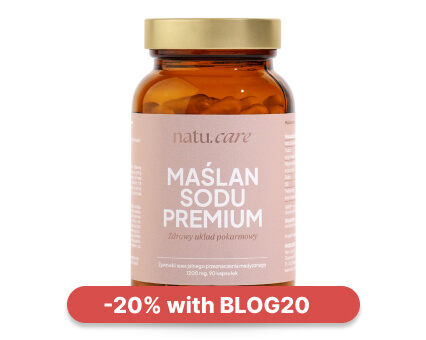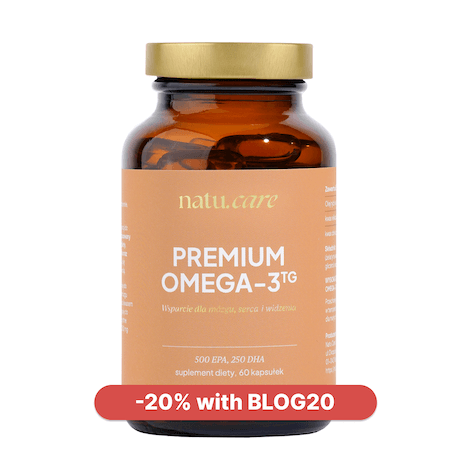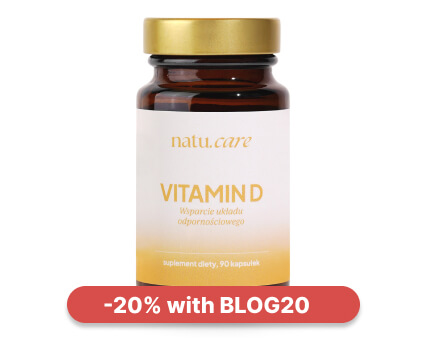How to look after your health? 13+ tips from a doctor, nutritionist and psychologist
Take care of your health every day. Learn how to do it effectively and with pleasure.


Learn more about our editorial process
.

Learn more about our editorial process
.

Learn more about our editorial process
.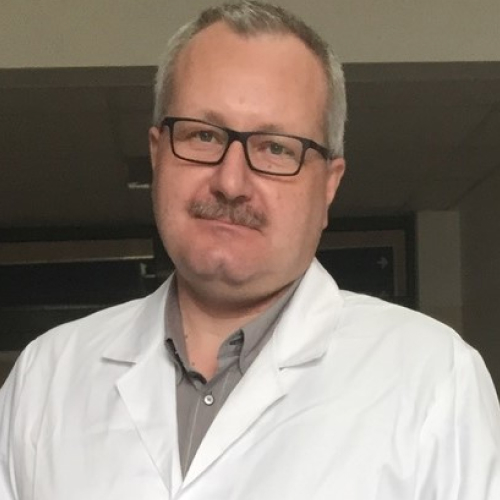

Learn more about our editorial process
.
Why you can trust us
Articles on Natu.Care are written based on scientific research, data from government websites and other reliable sources. The texts are written in cooperation with doctors, nutritionists and other health and beauty experts. Articles are reviewed before publication and during significant updates.
.Learn more about our editorial process
.Information about advertisements
Content on Natu.Care may contain links to products from the sale of which we may receive a commission. When creating content, we adhere to high editorial standards and take care to be objective about the products discussed. The presence of affiliate links is not dictated by our partners, and we select the products we review ourselves completely independently.
.Learn more about our terms and Conditions
.Taking care of your health doesn't have to be a full-blown ordeal. Together with experts - a doctor of medicine, a clinical nutritionist and a psychologist - we suggest how to take care of your health effectively, with pleasure and in accordance with scientific research.
The first step is to change your thinking. Then all it takes is a few minutes a day. And over time, the new normalcy will become so ingrained in your blood that you will never go back to your old habits.
The first step is to change your thinking.
From this article you will learn:
- How a balanced diet should look like .
- How to build healthy eating habits .
- Whether water is really life .
- How conscious supplementation looks like .
- Why it is worthwhile to have a check-up .
- How to take care of your head and psyche in a healthy way .
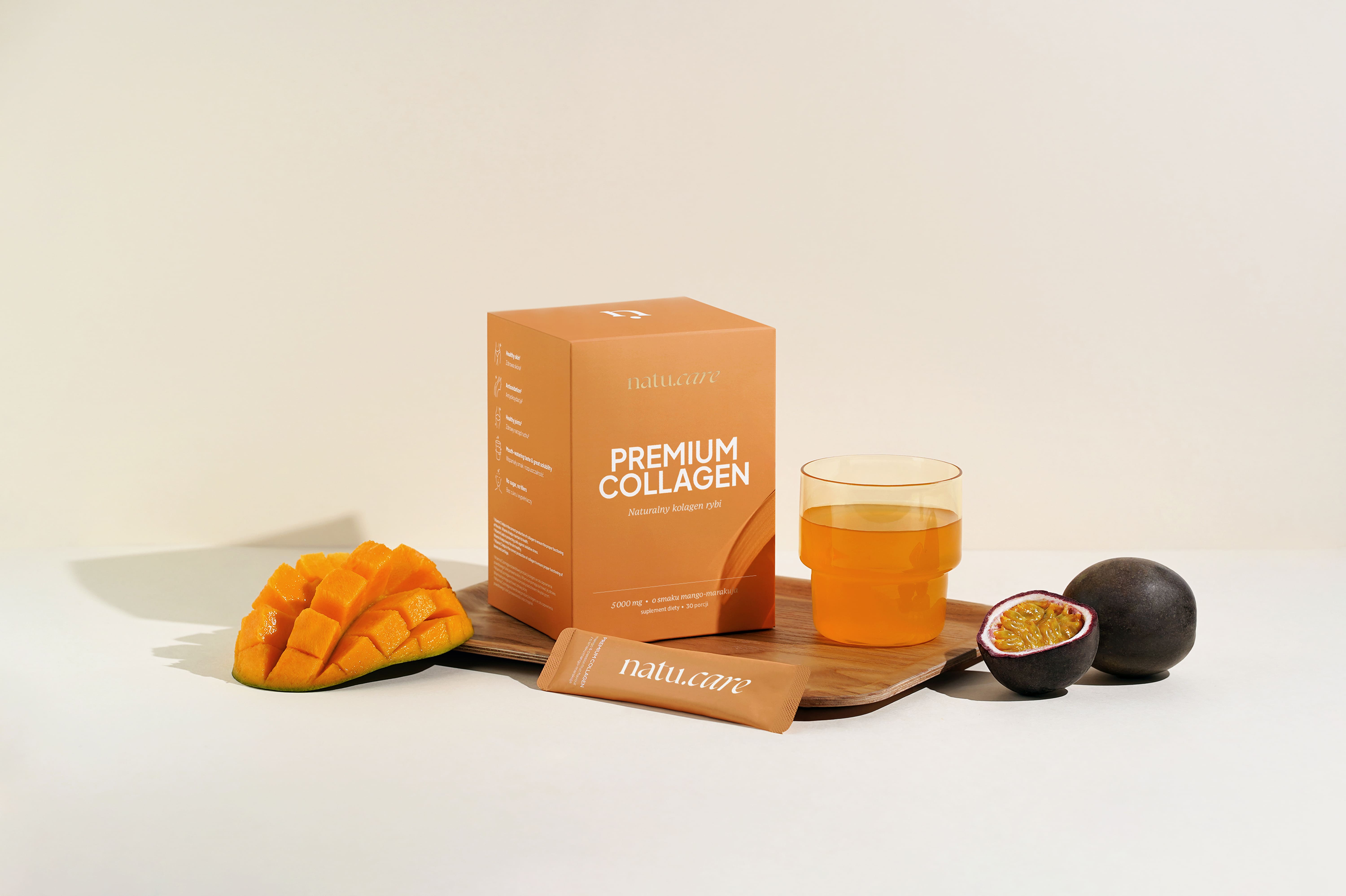
Sprawdź, za co pokochały go tysiące klientek Kolagen Premium 5000 mg, mango-marakuja
Natu.Care Kolagen Premium 5000 mg, mango-marakuja
Natu.Care Kolagen Premium dla zdrowia stawów, skóry, paznokci i włosów. Najlepsza przyswajalność. Optymalna dawka 5 000 lub 10 000 mg. Przebadany przez niezależne laboratorium.
Zobacz więcej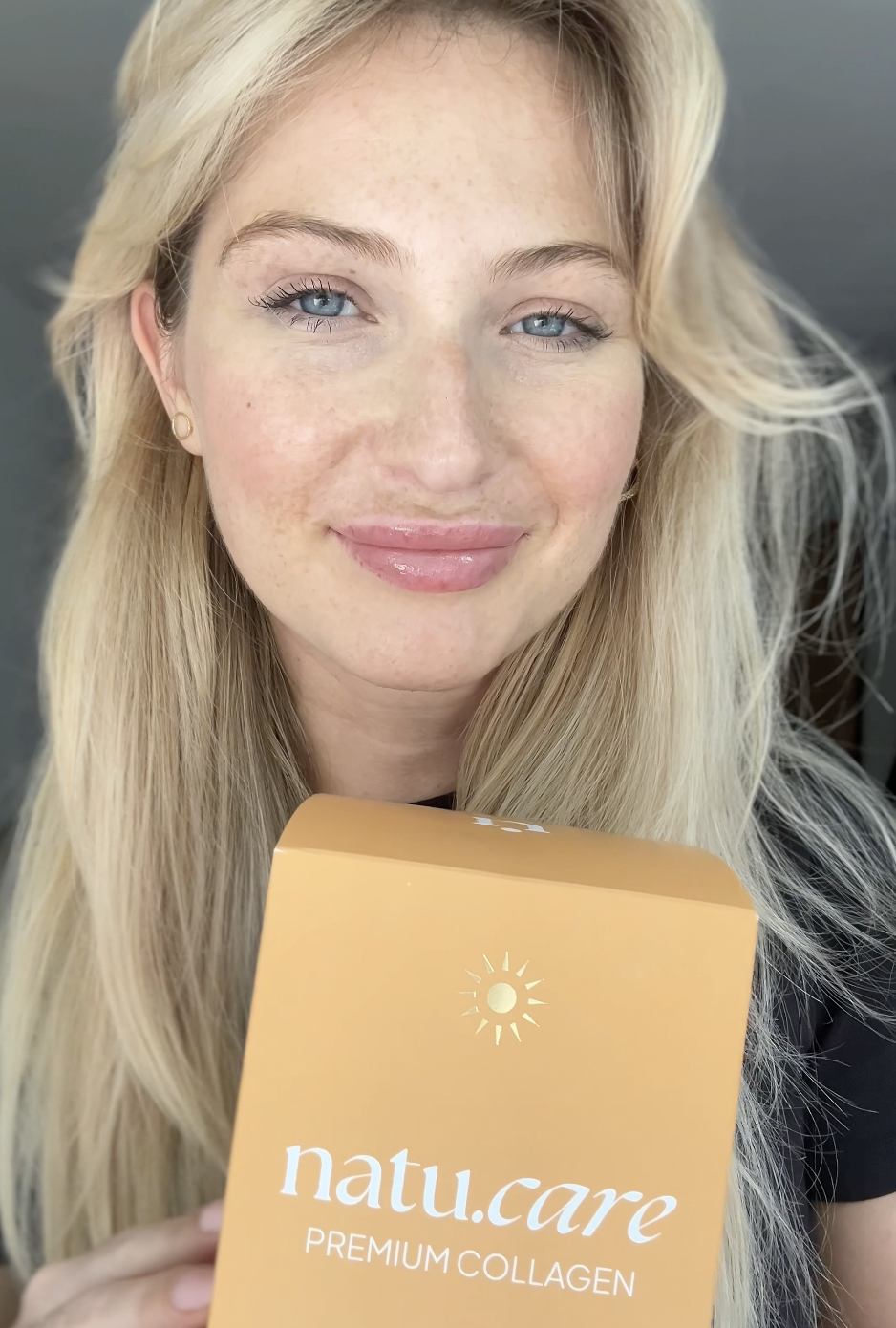
Wybrałam kolagen Natu.Care, ponieważ miał super opinie – a to było dla mnie bardzo ważne! Odkąd go stosuję, moja skóra znacznie się poprawiła i jest nawilżona, a na głowie pojawiły się nowe "baby hair".@Kasia S.
See also:
- Lung health after a pandemic
- The Mediterranean diet [the world's healthiest diet]
- How to eat with diabetes and insulin resistance
- Is the SIRT diet healthy? .
"No part will be healthy until the whole is healthy"
.
This quote attributed to Plato is the quintessential way to think about oneself and health.
People are like connected vessels. Each sphere of our lives affects the other: diet on our wellbeing, mental health on our relationships, good sleep on our performance at work.
It is not a good thing.
Only a holistic view of health will help you to function optimally and harmoniously and focus on long-term results.
Take this example:
.
You have been suffering from a lack of energy for a long time. Your first thought: I need a coffee or an energiser. Ok, that's a short-term solution. However, your condition may have a cause somewhere else entirely. Lack of sleep, hormonal problems, anxiety and nervous tension, deficiencies of vitamins and micronutrients, low mood or thyroid problems - these need to be carefully checked.
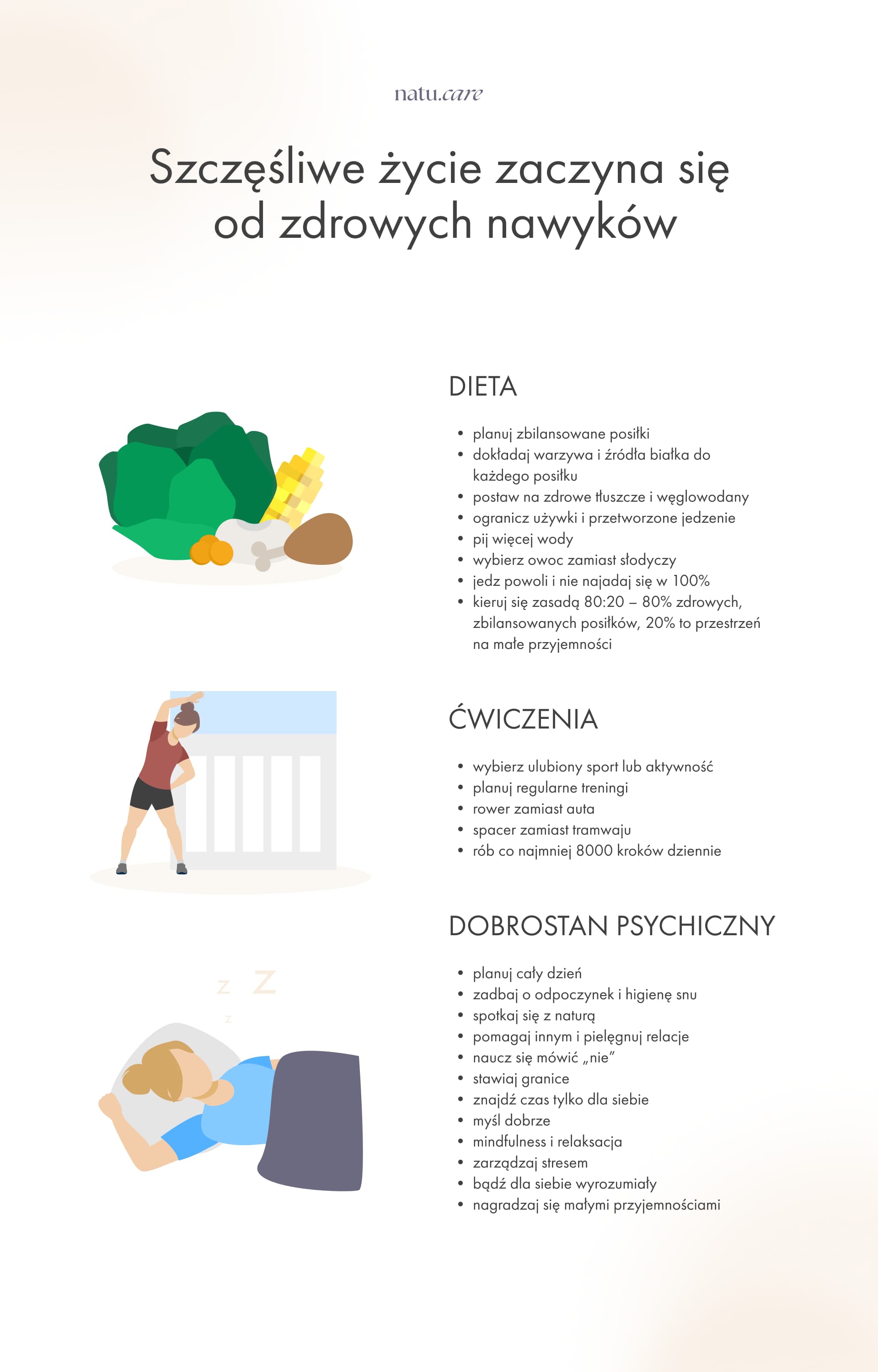
When reading this text, think of yourself as "whole".
How to maintain a healthy diet - a few words from a clinical nutritionist
.
Remember the balance of nutrients
.
You are probably familiar with the saying that you are what you eat. Meaning that food is not only fuel for our bodies, but also (continuing the automotive analogy) the necessary lubricants, fluids and oils. To run like a reliable machine, you need to ensure their harmonious composition.
The latest WHO guidelinesand on healthy eating:
- Consume at least 400 g of fruit and vegetables per day - add vegetables to every meal; .
- Limit your intake of sugars simply to 10% - ideally it should be less than 5%; .
- Care for an adequate supply of fats - this should be around 30% of your daily energy intake. Choose unsaturated fats, which can be found in fish, avocados, nuts and olive oil, among others;
- Care for an adequate supply of fats.
- Avoid saturated fats (fatty meat, butter, cheese, cream, coconut oil) and trans fats. Saturated fats should be less than 10% in your diet and trans fats should be less than 1%. .
- Limit your daily salt intake to 5g, or one teaspoon - choose iodised salt. .
There are a few more rules worth adding to this:
.
- .
- Eat regularly - approximately every 3-4 hours.
- .
- Drink plenty of water - start and end your day with a glass of water.
- Drink plenty of water - start and end your day with a glass of water.
- Climit stimulants - especially alcohol. .
- Make sure you get the right macroof your meals, i.e. protein, carbohydrate and fat content; .
- Read the ingredients of the products you buy and check the RWS values, which determine how much of a particular ingredient you should consume in a day .
- Eat for pleasure, not obligation.
- Eat for pleasure, not obligation.
- Take the word "diet" out of your head and replace it with "nutrition". .
- In your daily or weekly plan, follow the 80:20 rule, i.e. 80% of food is healthy and balanced and the remaining 20% is space for your little pleasures. .
- Avoid restrictive diets and elimination diets - unless your health requires it. .
Each country and nation has its own specific dietary guidelines, which are updated from time to time due to changes in civilisation. The Nutrition Standards for the Polish Populationand are prepared by experts from the National Institute of Public Health - National Institute of Hygiene (NIZP-PZH).
Take a look at your eating habits
.
Are you eating under stress? Are you always eating in front of a screen - whether at work or on Netflix? Don't have fixed meal times? Are you plagued by the yo-yo effect
>.
These are just some of the signs that you are eating inappropriately. It can spoil your wellbeing and take away your energy - your relationships and working life will suffer.
How to prevent this?
How to prevent this from happening?
.
The most important method is the small steps method. Things don't have to be perfect right away. Start with one change a week. Master one habit, such as drinking more water, and then add another. The next step could be more regular meal times. The next step is to include more vegetables in your daily menu. This is the best way to make new habits a permanent part of your life.
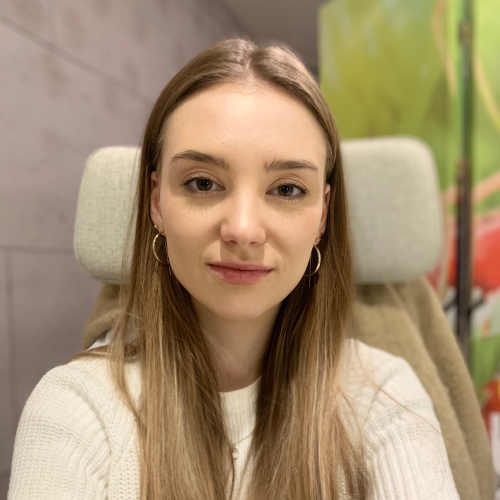 .
.
Julia SkrajdaDietitian
..
If you feel it's too much for you, ask a specialist for help. Start with a clinical dietitian or psychodietitian who will put together an eating plan tailored to your needs, health and taste preferences They will also help you reach your goal and "guide you by the hand" through any difficulties.
.
Remember that water is life
.
There is not a drop of exaggeration in this statement - water is an important component of every cell in our body. Over 60%and we are made up of water - the brain and heart 73%, lungs 83%, muscles and kidneys 79%, and bones around 31%.
Additionally, water is responsible for the proper functioning of our body. Including for:
- regulating our body temperature through breathing and sweating, .
- transporting nutrients, namely proteins and carbohydrates, into the bloodstream, .
- excretion of toxins and unnecessary metabolic products, .
- amortisation of the brain, spinal cord or fetus during pregnancy, .
- the formation of saliva, .
- greasing joints, .
Every day you lose up to 500 ml of water in your exhaled air. During hot weather or during increased exercise more. Try to drink between 2.5 (women) and 3.5 (men) litres of water every day.
For your own health and well-being, it's worth getting into the habit of drinking water regularly and hydrating your body. I know this can be difficult at first - especially if you lead a busy lifestyle - so try to systematically introduce the following principles:
- Begin your day with a glass of water -it's better than coffee: you'll improve your metabolism and give yourself energy.
- Water is a great way to start your day.
- Have water with you at all times - at your desk at work, on the move or on an afternoon walk.
- Keep water in sight - as soon as you see a glass or bottle is empty, fill it.
- Add healthy and tasty additions to your water (mint, lemon, lime, ginger, favourite fruit) - you'll be more likely to reach for what you enjoy.
- Reach for water before you feel thirsty - it or dry mouth are the first signs of dehydration.
- Start monitoring your daily fluid intake - divide your day into glasses/bottles, install an app or set reminders on your smartphone.
- Drink a glass of water before bed.
.
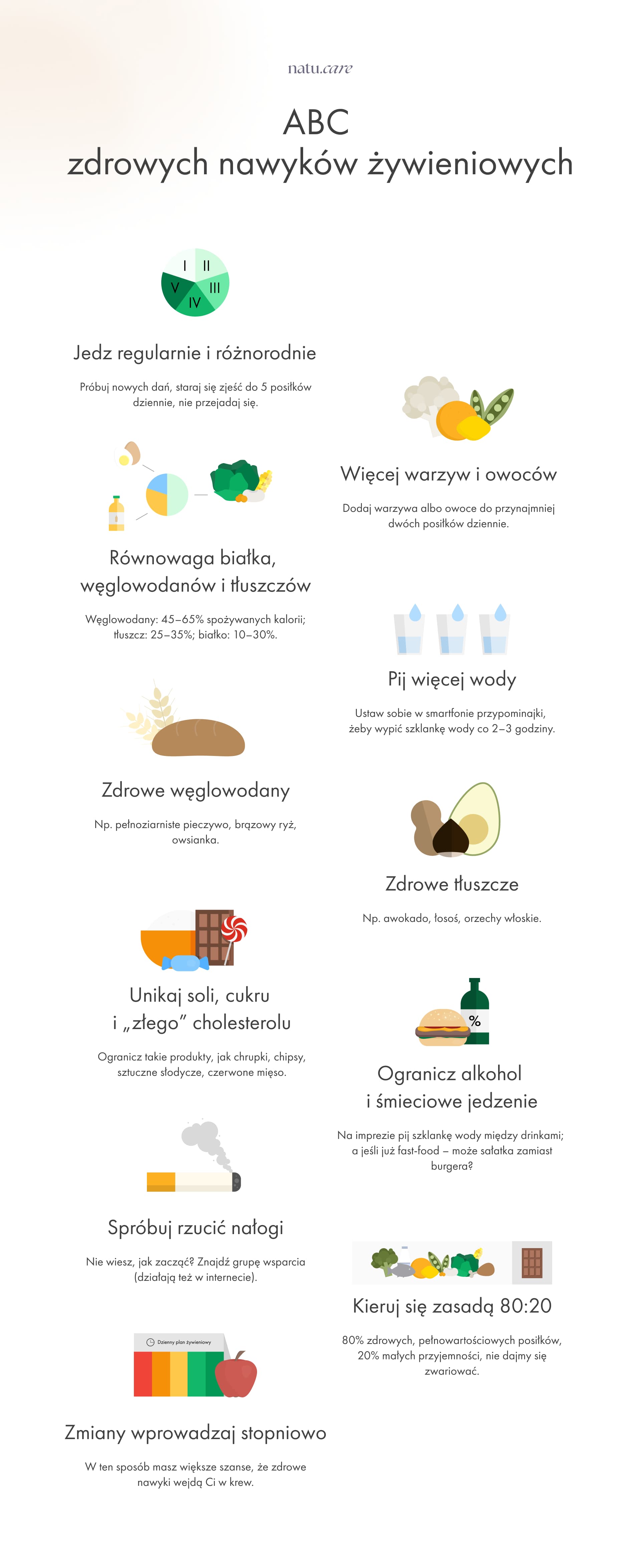
Supplementation? Only safe and informed
.
Here the matter is simple. Take care of a healthy and balanced diet first. This is the best way to provide your body with nutrients, vitamins, minerals and other micronutrients. Supplementation, i.e. supplementation of individual components, is the last resort.
.
However, in Poland we even love dietary supplements and ingest them at a mass.
.
Above 67% of Poles regularly take dietary supplements - most often vitamin and mineral preparations. In 2022, nearly PLN 7.7 billion was spent on them in our country - one billion more than in the previous year.
Is this a problem? Potentially yes, because vitamins can be overdosed, and excesses are sometimes more dangerous than deficiencies.
In the US alone, more than 60,000 people each year (including children before the age of 6) report symptoms of vitamin poisoningand.
Incompetent and overzealous supplementation can lead to such dangerous phenomena as:
- kidney failure, .
- diseases of the liver, .
- gastroenteritis and diabetes, .
- stomach disorders, .
- weight loss, .
- nausea, .
- disordered taste,
- disordered taste.
- weakening of muscles, .
- deterioration of vision, .
The effects of faulty supplementation will manifest themselves in the organs where the ingredient is absorbed and metabolised, The whole body will experience this excess..
 .
.
Julia SkrajdaDietitian
..
Who should take dietary supplements?
.
Persons with deficiencies or in a state of increased need. The most important groups are:
- pregnant and breastfeeding women, .
- people on elimination diets, including the ketogenic diet, .
- athletes and people doing hard physical work, .
- women using contraceptives, .
- persons taking metformin, .
- seniors and older people, .
- persons undergoing chemotherapy, .
- persons during recovery from illness, .
- persons working mentally, .
9 rules for safe and informed supplementation
.
- First a balanced diet, then supplementation. .
- Do blood tests and find out what you are lacking.
- Consult with your doctor.
- Consult the results with your doctor, pharmacist or clinical nutritionist. .
- Supplement only the ingredients you actually need. .
- Drug or supplement? If you have a choice, choose the drug.
- Supplement.
- A supplement is not the same as a supplement - choose trusted manufacturers. .
- Follow the recommendations of your specialist and the leaflet on the pack. .
- Do regular tests and determine the concentration of individual ingredients. .
- If everything is normal, you can stop supplementation, but the final decision should be made by your doctor. .
What substances are worth supplementing with?
.
It depends on your needs and health status. The most commonly recommended substances are:
- vitamin D - the one substance that basically everyone should supplement, as it is difficult to get 100% from the sun in our climate (and even more difficult in the diet), especially from autumn to summer, .
- unsaturated fatty acids Omega-3 and Omega-6, .
- vitamin B12, .
- iron, .
- folic acid, .
- calcium, .
- magnesium, .
- creatine and beta-alanine, .
- probiotics and prebiotics. .
Disruption of the gut microbiota is caused by a number of factors: stress, poor diet, use of antibiotics or medication. Supplementing the gut microbiota with prebiotic bacteria can alleviate many symptoms from the gastrointestinal tract, skin and psychological problems.
Daria Kotek MA Institute of Microecology
See also:
.
- Vitamin B12 deficiency - causes, symptoms, treatment
- Vitamin D deficiency - what symptoms may cause concern .
- Best vitamin D - which one to choose?
- Maximum vitamin D dose - what is the limit?
- Vitamin D overdose - is it possible?
- Omega acids - types, properties, deficiency .
- DHA acid - what is it, health properties, sources .
- Best magnesium - which one to choose and why?
- Do you need to combine vitamin D3 and K2?
- B vitamins
- Vitamin A
- Vitamin E
- MSM
- Zinc
Natu.Care Collagen Premium 5000 mg, mango & passion fruit

- Collagen content: 5000 mg marine collagen hydrolysate
- Additional active ingredients: vitamin C, low molecular weight hyaluronic acid (and L-theanine and coenzyme Q10 in cocoa flavoured collagen or vitamin A and vitamin E in mango–passion fruit flavoured collagen)
- Form: powder sachets
- Dose: 1 sachet per day
- Sufficient for: 30 days
Product description
Fish collagen from the Natu.Care brand in a dose of 5000 mg, based on certified ingredients of the best quality. Regular supplementation will positively influence the appearance of the skinóry, hairów and nails – they will be rebuilt and strengthened from the inside.
In addition to collagen, which is valuable for health and beauty, it also offers other active ingredients that help to maintain a youthful complexion, shiny hair and strong nails.
The formula contains a sufficient portion of the active ingredient to positively affect joints, the musculoskeletal system and immunity.
Natu.Care Premium Collagen is available in two flavours – Cacao Bloom and Rise&Shine. Both formulas are based on the following active ingredients: marine collagen hydrolysate, wild roseóbud extract and hyaluronic acid.
Additionally, Cacao Bloom contains natural L-theanine, coenzyme Q10 and defatted Dutch cacao. Rise&Shine instead contains vitamin E and vitamin A.
These are the best collagens in the world.
These best fish collagens on the market also rós taste – Cacao Bloom is a treat for chocolate lovers. Rise&Shine will appeal to those whoólike the refreshing taste of mangoófruit and passion fruit.
Pros and cons
Pros:
- Vitamin C supports the body's collagen production, enhancing its effectiveness.
- An effective dose of hyaluronic acid, which additionally supports skin hydration and joint health.
- Fish collagen absorbs 50% better. Additionally, the manufacturer specifies the fish species it is sourced from (Atlantic cod).
- The composition has been tested by the independent and accredited J.S. Hamilton laboratory.
- MSC (Marine Stewardship Council) quality certification, which confirms that the collagen source supports sustainable fishing practices.
Cons:
- None.
Additional information
Natu.Care's fish collagen receives praise for its delicious taste. You won't find the fishy aftertaste that often comes through in other collagens. Plus, you have two tasty flavors to choose from: cocoa and mango-passionfruit.
Active ingredients like coenzyme Q10, hyaluronic acid, and natural L-theanine provide anti-inflammatory and antioxidant benefits while slowing down aging processes.
User review
Super, after about 6 weeks of use, the skin on my face became noticeably firmer. Wonderful taste.
Ania ZalewskaNatu.Care customer
Natu.Care Premium collagen 10 000 mg, mango-maracuja
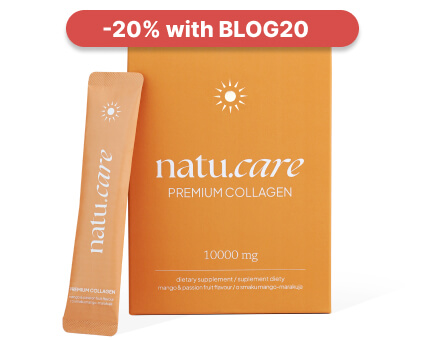
- Collagen content: 10,000 mg marine collagen hydrolysate
- Additional active ingredients: vitamin C, low molecular weight hyaluronic acid (and L-theanine and coenzyme Q10 in cocoa flavoured collagen or vitamin A and vitamin E in mango–passion fruit flavoured collagen)
- Form: powder sachets
- Dose: 1 sachet per day
- Sufficient for: 30 days
Product description
One of the strongest collagens on the market, whichós provides as much as 10,000 mg in a daily serving. This allows the formula to effectively support the condition of the skin, hair and nails.
With this supplement, you will support your beauty, which will allow you to visually stop the ageing process and feel a second youth!
Natu.Care Collagen Premium 10 000 mg comes in two flavours – cherry and mango-maracuja. Both formulas have the same product backbone – collagen, hyaluronic acid and vitamin C.
In the cherry version you additionally find glucosamine, chondroitin and Indian frankincense resin extract. Mango-maracuja, on the other hand, contains vitamin E and vitamin A.
Pros and cons
Pros:
- Tested collagen formula – SeaGarden, whose effects have been confirmed in clinical studies.
- Effective dose of hyaluronic acid, additionally moisturizing the skin and positively impacting joint health.
- Vitamin C supports the body’s natural collagen production.
- The composition has been tested by the independent and accredited J.S. Hamilton laboratory.
- The product has an MSC (Marine Stewardship Council) quality certification – the collagen source supports sustainable fishing practices.
Cons:
- None.
Additional information
Users praise Natu.Care Collagen Premium for the easy dissolvability of the powder.
User review
I noticed a significant improvement in my skin texture after a few weeks of taking collagen regularly. My complexion is now as soft as velvet!
Natu.Care Collagen Premium 10000 mg, cherry

- Collagen content: 10,000 mg of hydrolyzed bovine collagen
- Additional active ingredients: vitamin C, low molecular weight hyaluronic acid, glucosamine, chondroitin, extract of Indian frankincense resin (boswellia serrata)
- Form: powder sachets for drinking
- Serving: 1 sachet per day
- Lasts for: 30 days
Product description
One of the strongest collagens on the market, providing as much as 10,000 mg per daily serving. This product can effectively support the condition of joints, skin, hair, and nails.
With this supplement, you will support your skeletal and joint system as well as your beauty, helping you visually halt the aging process and feel rejuvenated!
Pros and cons
Pros:
- The daily portion of collagen is very large – as much as 10,000 mg.
- Proven collagen formula – COLLinstant, whose effectiveness has been confirmed in clinical studies.
- Effective dose of hyaluronic acid, which additionally moisturizes the skin and positively affects joint health.
- Vitamin C supports the body's natural collagen production.
- Glucosamine is a fundamental building block of compounds found in joint cartilage and a component of collagen that gives elasticity to connective tissue in tendons.
- Chondroitin is a natural component found in the human body, mainly in cartilage. This large molecule (mucopolysaccharide) has the ability to absorb water, which helps maintain the elasticity and resilience of cartilage.
- Frankincense resin extract supports blood circulation and joint mobility and reduces their stiffness. It may help alleviate inflammatory conditions.
- The composition has been tested by the independent and accredited J.S. Hamilton laboratory.
Cons:
- None.
Additional information
Users praise Natu.Care Collagen Premium for the easy dissolving of the powder.
Premium Sodium Butyrate
Product description
Premium Sodium Butyrate is a natural support for your digestive system. With a high dose of butyric acid (940 mg), it supports the regeneration of the intestinal mucosa, improving gut health and function, and aids in the absorption of nutrients. By taking care of your intestines, you're taking care of the health of your entire body.
Studies involving people suffering from irritable bowel syndrome confirm that sodium butyrate is ideal for supporting issues related to bacterial flora imbalances (for example, after antibiotic therapy), constipation and diarrhea, inflammation of the intestinal mucosa, or a diet low in fiber.
Premium Sodium Butyrate capsules are made using the innovative DRcaps® technology. This guarantees that the active ingredients in the product are protected from the destructive effects of stomach acids and digestive enzymes. As a result, we can be sure that the beneficial ingredients are released in the small intestine and are fully absorbed by our body.
Premium Sodium Butyrate from Natu Care is 100% tested, and its composition contains only the highest quality raw materials.
Pros and cons
Pros:
- Supports digestive system function
- Helpful for various gastrointestinal conditions, including IBS
- High dose of butyric acid in each capsule
- Eco-friendly, clean, and tested composition
- Free from added sugar, gluten, GMOs, and lactose
- Innovative capsule technology - DRcaps
Cons:
- None
Additional Information
Take 3 capsules daily at any time of the day, preferably with a meal. Swallow the capsules whole with water.
Premium Sodium Butyrate is intended for adults.
The product should be used under medical supervision.
User review
I've been using the product for 2 weeks. My stomach feels lighter, and my digestion has improved. I recommend it.
Natu.Care Premium Magnesium + Vitamin B6
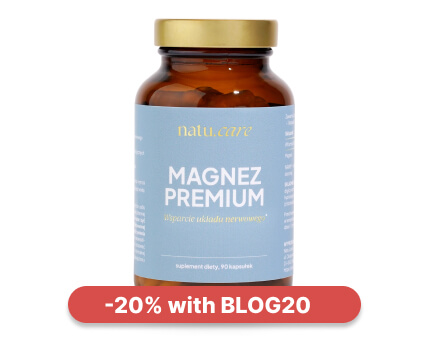
- Magnesium content per day: 305 mg
- Additional active ingredients: Vitamin B6 (2.1 mg)
- Form: capsules
- Serving size: 3 capsules per day
- Sufficient for: 30 days
Product description
The Premium Magnesium + Vitamin B6 dietary supplement is a comprehensive product that combines three organic forms of magnesium (citrate, malate, and diglycinate) and vitamin B6 in highly absorbable forms.
Magnesium is an essential mineral without which our bodies cannot function properly. It supports the immune, nervous, and muscular systems, maintains electrolyte balance, and is involved in cell division and the regulation of mental functions.
Research shows that magnesium supplementation is even more effective when accompanied by vitamin B6, which is included in our product. Vitamin B6 is responsible for the proper functioning of the nervous and immune systems, as well as the proper functioning of the heart.
If you want to safely get rid of feelings of fatigue, concentration problems, hair loss, muscle cramps, trembling, or irritability, reach for Premium Magnesium from Natu.Care, tested by the independent, certified laboratory J.S. Hamilton Poland.
Pros and cons
Pros
- Supports the proper functioning of the nervous and immune systems.
- Reduces feelings of fatigue and tiredness.
- Maintains proper psychological functions.
- The purity of the ingredients (free from anti-caking agents, artificial fillers, and additives such as titanium dioxide, microcrystalline cellulose, talc, magnesium stearate, and silicon dioxide) has been confirmed by laboratory tests.
- High absorption of ingredients.
- Soft capsules that are easy to swallow.
- Suitable for vegetarians and vegans.
Cons
- None.
Additional information
Take with a meal, 3 capsules per day.
The capsules should be taken with at least 250 ml of water.
If you have trouble sleeping, it is advisable to take 1 capsule in the morning and 2 capsules in the evening, no later than 4 hours before bedtime.
Avoid combining with products high in calcium (milk, yogurt, cheese), as this may negatively affect magnesium absorption.
Pregnant and breastfeeding women should consult a doctor before starting supplementation.
User review
I’m very impressed with the speed of delivery. The product itself is of high quality and absorbs well. After two weeks of supplementation, I’ve noticed a significant improvement in muscle recovery, especially during periods of intense training. I highly recommend it!
Product description
The dietary supplement contains omega-3ᵀᴳ, or omega-3 acids in the form of trójglyceridesów. Scientific studies suggest that this form of fatty acidsós up to 2 times better absorbed than the estersós present in many dietary supplements on the market. This means that you are assured of their effectiveness and of supplying yourself with valuable omega acids.
Fatty acids omega-3 are derived from wild anchovy oil. It is a rich source of healthy fats that are essential for the health of the cardiovascular, immune and nervous systems, as well as the proper function of vision, joints muscles.
Scientific research suggests that wild anchovies are a good source of healthy fats.
Scientific research also suggests that an adequate intake of omega-3 fatty acidsós protects against and supports the treatment of depression and anxiety disorders. In addition, omega-3s influence the hydration and appearance of the skinóry and support healthy sleep.
.
The formula contains a total of 750 mg of EPA+DHA acidsós, which is three times higher than the recommended minimum of 250 mg for the Polish population. Omega-3 TG Premium has studies indicating that its TOTOX is 9, which is a very good result.
Supplementation of omega-3 fatty acidsóis recommended for anyone who does not eat 1–2 portions (approximately 300 g) of oily fish per week. Children during growth, seniors, physically active people, vegans and vegetarians, as well as patients undergoing cardiovascular treatment and prevention of heart disease also have an increased need.
Pros and cons
The dietary supplement contains omega-3ᵀᴳ, or omega-3 acids in the form of trójglyceridesów. Scientific studies suggest that this form of fatty acidsós up to 2 times better absorbed than the estersós present in many dietary supplements on the market. This means that you are assured of their effectiveness and of supplying yourself with valuable omega acids.
Fatty acids omega-3 are derived from wild anchovy oil. It is a rich source of healthy fats that are essential for the health of the cardiovascular, immune and nervous systems, as well as the proper function of vision, joints muscles.
Scientific research suggests that wild anchovies are a good source of healthy fats.
Scientific research also suggests that an adequate intake of omega-3 fatty acidsós protects against and supports the treatment of depression and anxiety disorders. In addition, omega-3s influence the hydration and appearance of the skinóry and support healthy sleep.
.
The formula contains a total of 750 mg of EPA+DHA acidsós, which is three times higher than the recommended minimum of 250 mg for the Polish population. Omega-3 TG Premium has studies indicating that its TOTOX is 9, which is a very good result.
Supplementation of omega-3 fatty acidsóis recommended for anyone who does not eat 1–2 portions (approximately 300 g) of oily fish per week. Children during growth, seniors, physically active people, vegans and vegetarians, as well as patients undergoing cardiovascular treatment and prevention of heart disease also have an increased need.
Additional information
The dietary supplement contains omega-3ᵀᴳ, or omega-3 acids in the form of trójglyceridesów. Scientific studies suggest that this form of fatty acidsós up to 2 times better absorbed than the estersós present in many dietary supplements on the market. This means that you are assured of their effectiveness and of supplying yourself with valuable omega acids.
Fatty acids omega-3 are derived from wild anchovy oil. It is a rich source of healthy fats that are essential for the health of the cardiovascular, immune and nervous systems, as well as the proper function of vision, joints muscles.
Scientific research suggests that wild anchovies are a good source of healthy fats.
Scientific research also suggests that an adequate intake of omega-3 fatty acidsós protects against and supports the treatment of depression and anxiety disorders. In addition, omega-3s influence the hydration and appearance of the skinóry and support healthy sleep.
.
The formula contains a total of 750 mg of EPA+DHA acidsós, which is three times higher than the recommended minimum of 250 mg for the Polish population. Omega-3 TG Premium has studies indicating that its TOTOX is 9, which is a very good result.
Supplementation of omega-3 fatty acidsóis recommended for anyone who does not eat 1–2 portions (approximately 300 g) of oily fish per week. Children during growth, seniors, physically active people, vegans and vegetarians, as well as patients undergoing cardiovascular treatment and prevention of heart disease also have an increased need.
Expert opinion
The dietary supplement contains omega-3ᵀᴳ, or omega-3 acids in the form of trójglyceridesów. Scientific studies suggest that this form of fatty acidsós up to 2 times better absorbed than the estersós present in many dietary supplements on the market. This means that you are assured of their effectiveness and of supplying yourself with valuable omega acids.
Fatty acids omega-3 are derived from wild anchovy oil. It is a rich source of healthy fats that are essential for the health of the cardiovascular, immune and nervous systems, as well as the proper function of vision, joints muscles.
Scientific research suggests that wild anchovies are a good source of healthy fats.
Scientific research also suggests that an adequate intake of omega-3 fatty acidsós protects against and supports the treatment of depression and anxiety disorders. In addition, omega-3s influence the hydration and appearance of the skinóry and support healthy sleep.
.
The formula contains a total of 750 mg of EPA+DHA acidsós, which is three times higher than the recommended minimum of 250 mg for the Polish population. Omega-3 TG Premium has studies indicating that its TOTOX is 9, which is a very good result.
Supplementation of omega-3 fatty acidsóis recommended for anyone who does not eat 1–2 portions (approximately 300 g) of oily fish per week. Children during growth, seniors, physically active people, vegans and vegetarians, as well as patients undergoing cardiovascular treatment and prevention of heart disease also have an increased need.
Natu.Care Vitamin D 2000 UI
Product description
Vitamin D plays a crucial role in our health and well-being. It affects calcium and phosphate metabolism, which translates to healthy bones and teeth. It also helps regulate the immune system, and studies indicate its influence on the functioning of the nervous system.
Vitamin D, although called a “vitamin,” is actually a prohormone that our body produces on its own, primarily under the influence of sunlight. Unfortunately, our modern lifestyle contributes to deficiencies of this essential vitamin. Working in enclosed office buildings, using (necessary!) SPF creams, and covering the body with clothing all make it very difficult, if not impossible, to obtain adequate levels of vitamin D from sunlight. This is why appropriate, year-round supplementation is so crucial.
Vitamin D from Natu.Care is a well-tested vitamin D3 suspended in safflower oil, a plant known for its numerous health benefits. The convenient, easy-to-swallow capsule will make supplementation a part of your daily, healthy routine, improving your overall well-being.
Pros and cons
Pros:
- Ensures proper functioning of the immune system
- Supports the maintenance of healthy bones and teeth
- Maintains proper heart, kidney, and muscle function
- Tested by an independent, certified laboratory
- Convenient and easy-to-swallow capsule
- Clean composition - free from added sugar, gluten, GMOs, lactose, and without preservatives or colorants
Cons:
- None.
Additional Information
Pregnant women and breastfeeding mothers should consult a doctor before using the product. This dietary supplement is intended for a healthy adult population up to the age of 75.
Collagen Booster - Glow Stories
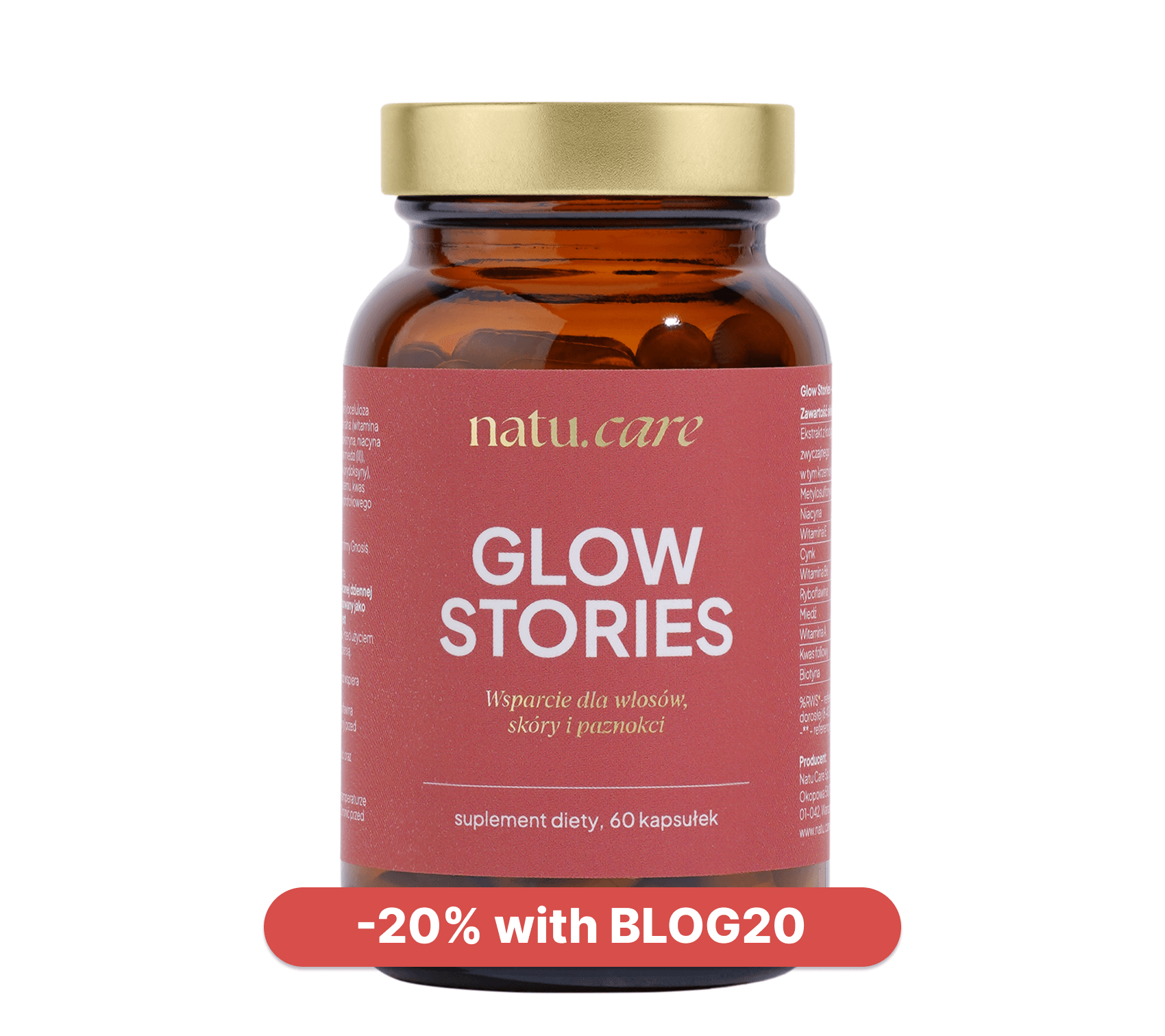
- Active ingredients: bamboo shoot extract, Quatrefolic®, L-Methionine, L-cysteine, vitamin E, vitamin A, niacin (vitamin B3), vitamin B6, vitamin B2 (riboflavin), biotin, zinc, copper
- .
- Form: capsules
- .
- Dose: 1 capsule per day
- .
- Sufficient for: 60 days
- .
Product description
A dietary supplement containing vitamins, minerals and plant extracts thatósupport the skinóhand, hair and nails. The product is especially distinguished by the form of folate – it is Quatrefolic, whichós absorbed very well and is natural.
In addition to valuable vitamins and minerals, such as vitamin A, E, B3, B2 and biotin, the formula contains bamboo shoot extract, whichóry further enhances your beauty.
Pros and cons
A dietary supplement containing vitamins, minerals and plant extracts thatósupport the skinóhand, hair and nails. The product is especially distinguished by the form of folate – it is Quatrefolic, whichós absorbed very well and is natural.
In addition to valuable vitamins and minerals, such as vitamin A, E, B3, B2 and biotin, the formula contains bamboo shoot extract, whichóry further enhances your beauty.
Additional information
A dietary supplement containing vitamins, minerals and plant extracts thatósupport the skinóhand, hair and nails. The product is especially distinguished by the form of folate – it is Quatrefolic, whichós absorbed very well and is natural.
In addition to valuable vitamins and minerals, such as vitamin A, E, B3, B2 and biotin, the formula contains bamboo shoot extract, whichóry further enhances your beauty.
Caring for a healthy lifestyle isn't just about running in the park in the morning - some advice from a doctor
Prevention is better than cure, so get checked regularly
.
Systematic preventive examinations are the basis of health care. Unfortunately, in Poland we are more concerned about our cars than ourselves. We are not exaggerating - as many as 83% of car owners take their vehicle to a mechanic at least once a year and check its technical condition. Meanwhile, only 57% of Polish people get tested at least once a year, performing a morphology or other basic blood tests.
Other data are equally worrying:
.
- As many as 1 in 10 men have never had a blood test. .
- 60% of women have a basic blood test at least once a year.
- 70% of people have never had a blood test.
- 70% of people aged 55+ have a blood test at least once a year.
- Other screening tests
- Other health checkups (dental check-ups or eye examinations) are performed once a year by only 33% of Poles and twice a year by only 12%. .
Examinations and preventive care reduce the risk of disease, disability and help detect conditions at an early stageand. In practice - they allow you to live a longer and happier life.
What checks are worth doing? You can find out everything in the Preventive check-ups calendar.
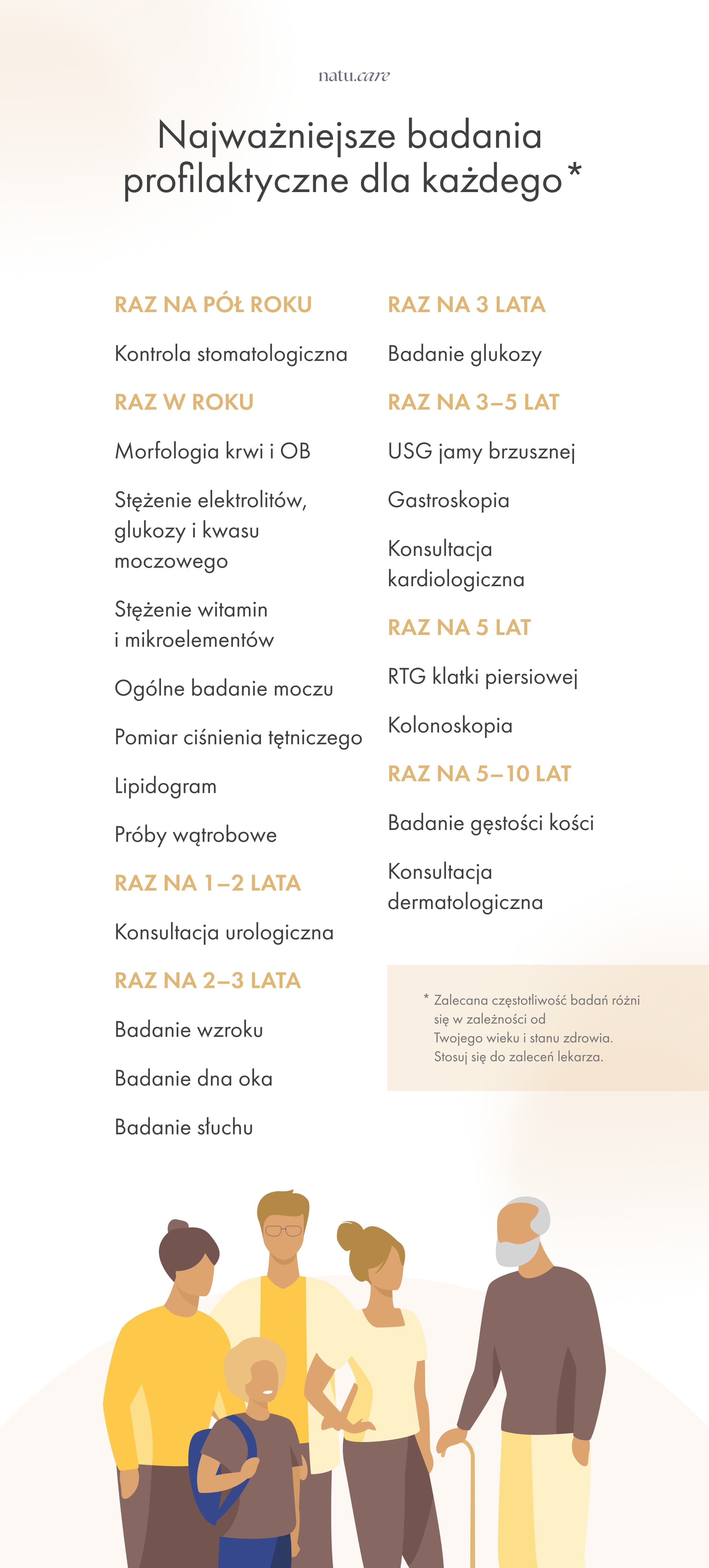
.
Screenings for 20-30 year olds
.
ALL
- Dental check-ups - once every six months.
- Dental check-ups.
- Basic kit: morphology, ESR (Biernacki's precipitation), glucose levels, urinalysis - once a year.
- Blood pressure measurement, weight control and general examination with an internist - once a year. .
- Measurement of blood electrolyte levels (potassium, sodium, magnesium, phosphorus, calcium) - once every 3 years. .
- Lipidogram (measurement of blood cholesterol and its HDL and LDL fractions and triglycerides) - once every 5 years. .
- USG of the abdominal cavity - once every 3-5 years. .
- RTG of the chest (especially smokers) - once every 5 years. .
- Check of nevi with a dermatologist - every few years.
- Check of nevi with a dermatologist - every few years.
WOMEN
- Breast self-examination - once a month (between days 6 and 9 of the cycle).
- Breast examination - once a month (between days 6 and 9 of the cycle).
- Gynaecological examination and cytology (preferably by the same trusted doctor) - once a year.
- Gynaecological examination and cytology - once a year.
- Transvaginal ultrasound - once every 2 years. .
If you have a family history of cancer from the age of 20, have a regular nipple ultrasound (once every six months) and mammogram (once a year).
MEN
- Testicular self-examination - once a month.
- Testicular examination - once a month.
- Testicular examination by a doctor (for testicular cancer) - once every 3 years.
- Testicular examination by a doctor (for testicular cancer) - once every 3 years.
- Proctological examination (for men at risk of prostate disease) - once. .
Testicular cancer accounts for as much as 1% of all malignant tumours in men. It is most common in men in the 15-35 years group
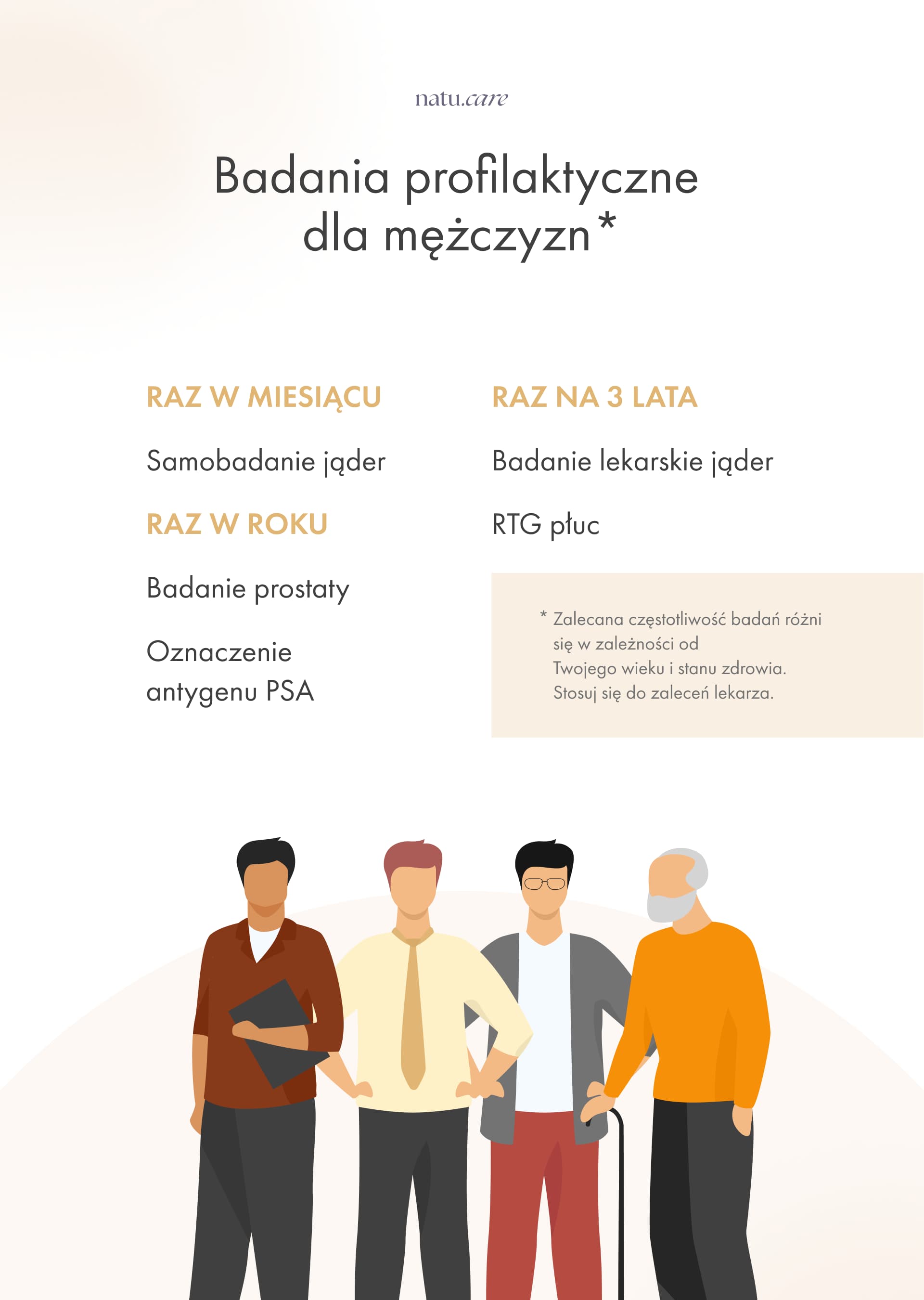
Testing for 30-40 year olds
- .
ALL
- Dental check-ups - once every six months.
- Dental check-ups.
- Basic kit: morphology, ESR (Biernacki's precipitation), glucose levels, urinalysis - once a year.
- Blood pressure measurement, weight control and general examination with an internist - once a year. .
- Measurement of blood electrolyte levels (potassium, sodium, magnesium, phosphorus, calcium) - once every 3 years. .
- Lipidogram - once every 5 years. .
- USG of the abdomen - once every 3 to 5 years.
- Cranial x-ray - once every 3 to 5 years.
- RTG of the chest (especially smokers) - once every 5 years. .
- Check of eyesight and fundus examination - once every 5 years (in case of identified defects, checks according to doctor's recommendations).
WOMEN
- Breast self-examination - once a month .
- Gynaecological examination and cytology - once a year .
- Breast USG - once a year .
- Tranvaginal ultrasound of the reproductive organs - once .
MEN
- Testicular self-examination - once every six months .
- Examination of the testicles by a doctor (for cancer) - once every 3 years .
- Proctological examination (for men at risk of prostate disease) - once .
Basic blood tests do regularly - at least once a year, not just when you feel something is wrong.
- .
Blood tests for people aged 40-50
- .
ALL
- Basic kit (morphology, ESR, glucose, general urinalysis) - once a year .
- Blood pressure, weight control, general examination with an internist - once a year .
- Lipidogram - once every 2 years, and if you are at risk of atherosclerosis and cardiovascular disease, are overweight or smoke - once a year .
- Check of eyesight, funduscopic examination and intraocular pressure - once every 2 years .
- Ecg - once every 3 years .
- Abdominal USG - once every 3-5 years .
- RTG of the chest - once every 5 years, and if you smoke, once a year .
- Gastroscopy - once every 5 years .
- Bone density test - once .
- Dental examination and teeth cleaning of plaque - once every six months .
- Dermatological check-up of nevi and moles .
As part of colorectal prevention, it is a good idea to have a faecal occult blood test once a year
WOMEN
- Breast self-examination - once a month .
- Gynaecological examination and cytology - once a year .
- Tranvaginal ultrasound - once every 2 years .
- Breast ultrasound and mammography - once every two years .
- Thyroid hormone testing - once .
MEN
- Testicular self-examination - once a month .
- Prostate check-up - once a year .
- Lung X-ray - once every 2 years (smokers as advised by their doctor) .
Tests for people aged 50+
- .
ALL
- Baseline kit + lipidogram - once a year .
- Blood pressure - every 3 months .
- Weight control, general examination at internist - once a year .
- Abdominal USG - once a year .
- RTG of the chest - once every 5 years, and smokers once a year as part of lung cancer diagnosis .
- Bone density test - once .
- Colonoscopy - at least once every 5 years .
- Ecg - once a year .
- Ophthalmological examinations - once a year .
- Dental examination and teeth cleaning - once every six months .
- ENT consultation - once every 2-3 years .
- Dermatology consultation - once every 5-10 years .
- Urology consultation - once a year .
- Cardiology consultation - once every 3-5 years .
- Determination of magnesium, uric acid, creatinine and albumin concentrations - once a year .
WOMEN
- Gynaecological examinations, cytology and ultrasound of the reproductive organs - once a year .
- Mammography - once every 2 years .
- Breast self-examination - once a month .
- Thyroid examination - once a year .
- Sex hormone determination - once every 2-3 years .
- Calcium and phosphate determination - once a year .
MEN
- Prostate check-up (per rectum examination) - once every 2 years .
- PSA antigen determination (helps detect prostate cancer) - once a year .
- Testicular self-examination - once a month .
- Testicular examination by a doctor - once every 3 years .
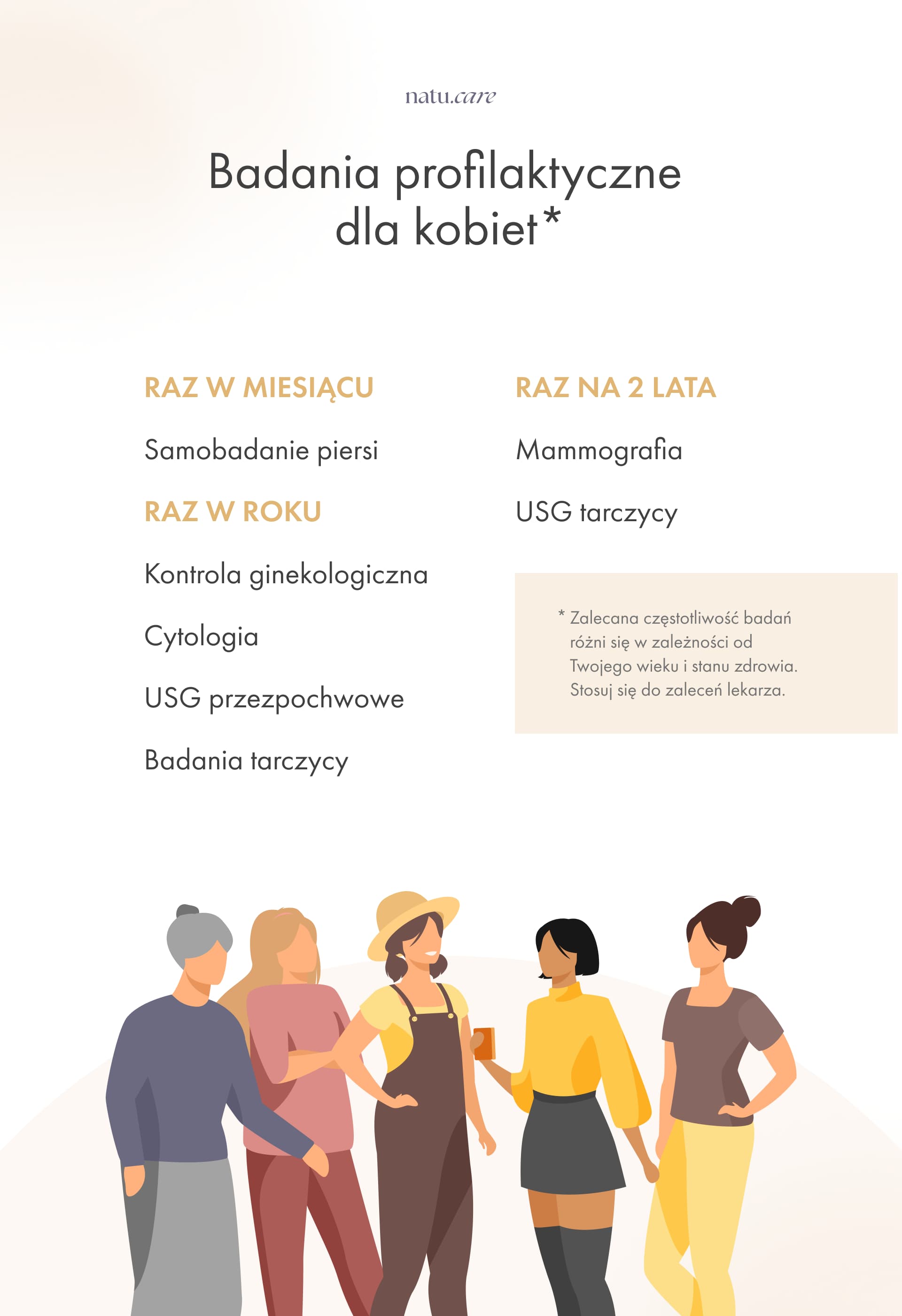
If you haven't had regular checkups so far and you're afraid you'll forget when to do your next one - make an appointment for your next one and set a reminder on your smartphone for that date or the day before to prepare for it.
Every year in Poland, there are prevention programmes that encourage people to get free tests, and diagnostic laboratories give substantial discounts on their services. One such ongoing campaign is Prophylaxis 40 PLUS. Check out more at NFZ.
See also:
Preventive tests for seniors
- .
In addition to the standard tests for men and women, the most recommended preventive tests for seniors are:
- Pressure check - once a month .
- Lipidogram - once a year .
- Exercise and resting ECG - once a year .
- Glucose testing - once a year .
- Liver tests - once a year .
- Determination of vitamin D, B12, B9, iron and ferritin - once a year .
- Creatinine and uric acid testing - once a year .
- Dental check-up - once a year .
- USG abdominal scan - once a year .
- Electrolyte determination - once every 2-3 years .
- Thyroid ultrasound - once every 2-3 years .
- Ionogram - once every 2-3 years .
- Gastroscopy - once every 3-5 years .
- RTG of the chest - once every 5 years .
- Cancer screening .
- .
Care for your loved ones and take advantage of various occasions throughout the year to present them with a package of check-ups. Birthdays, name days, Mother's and Father's Day, Grandmother's and Grandfather's Day or holidays and anniversaries are perfect for this.
There are prophylaxis kiosks in the provincial branches of the National Health Fund, where you can take free body measurements (weight, height, body composition analysis, blood pressure) and a counsellor will discuss the results with you.
- .
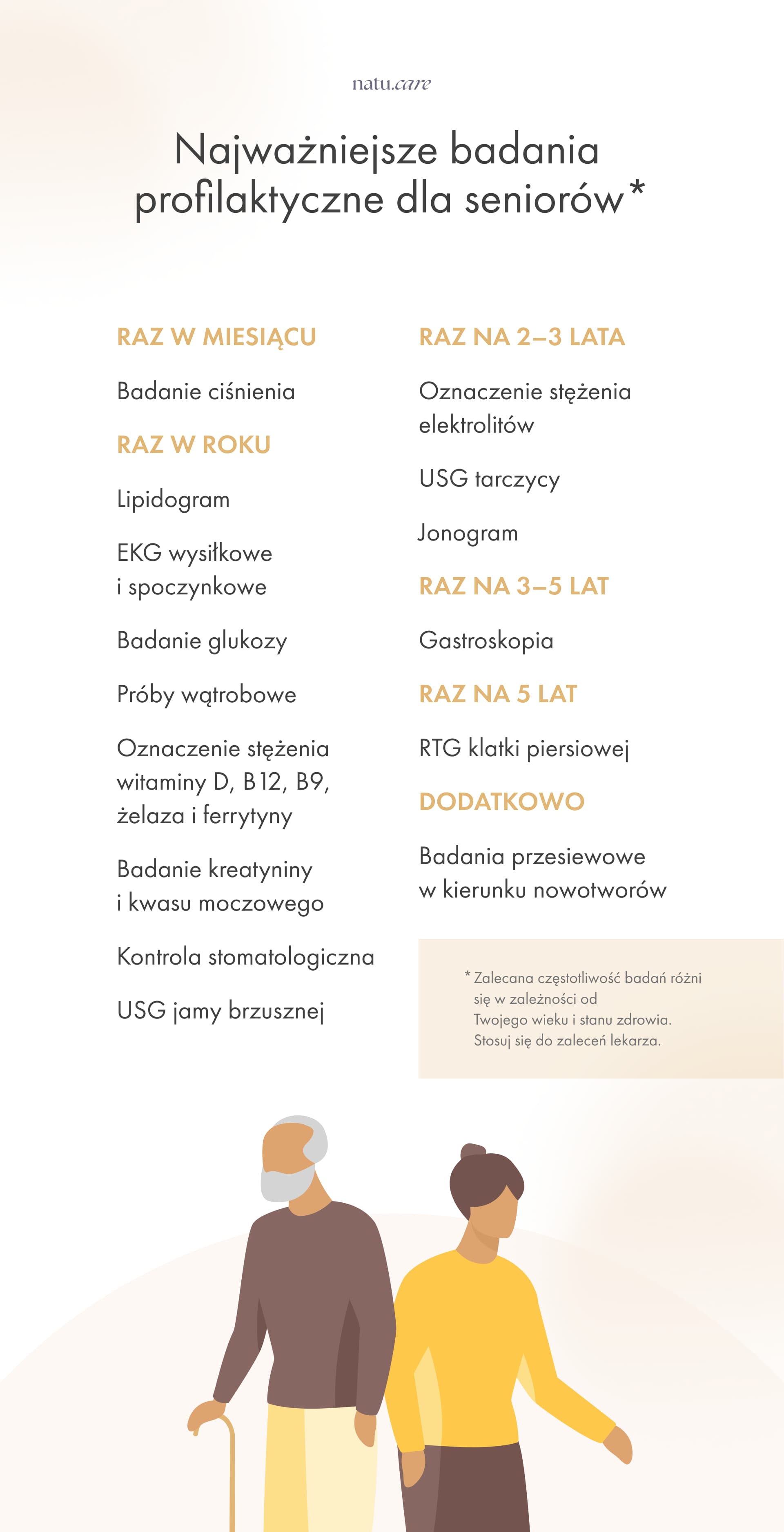
What about children and young people?
- .
Children and adolescents are covered by universal preventive checkups, so-called "balance sheets", which help to detect developmental abnormalities or possible diseases at various stages. Balance sheets are carried out from the age of 2 to 18 and include:
- physical measurements,
- physical examination
- examinations for posture, vision and hearing defects, .
- examination of blood pressure, .
- examination of mental development, .
- medical interview, .
As part of your child's preventive health care - regardless of age - it is also a good idea to have regular:
- blood tests (blood count, ESR, ASO, CRP), .
- Iron and ferritin determination,
- Blood tests (blood count, ESR, CRP).
- determination of vitamin D concentrations,
- examination of blood glucose
- glucose test,
- fluoride test,
- urine test (urine),
- fluoride test.
- urinal examination (general, culture),
- fecal examination,
- fecal examination.
- fecal examination, .
- USG abdominal examination, .
- dental check-ups, .
- orthopaedic check-ups,
- physical check-ups, .
- language therapy checks, .
Move on!
- .
You don't have to immediately pour out hectolitres of sweat at the gym - it's not even advisable to begin with. Instead of helping you, you could harm yourself, get injured, or just plain demotivate yourself.
The World Health Organisation (WHO) recommends at least 150 minutes of moderate physical activity or at least 75 minutes of vigorous activity per week for adultsand.
- .
Choose the sport or physical activity you enjoy most and start practising it. Regularly. The effects will surprise you. Just remember to adapt the intensity of the activity to your own possibilities and state of health.
And if you don't know what to do, go for a walk. Still not many people realise how great its power is.
And if you don't know what to do, put on a walk.
Even a simple walk - it can be with a dog if you have one - as long as it's regular, will have many benefits: it reduces the risk of heart disease, boosts immunity, helps shed excess weight, as well as improving mood and reducing tension.
 .
.
Witold Tomaszewskidoctor of medical sciences
.Get out of the house
.Spending time outdoors has a myriad of benefits for the brain.
- .
Some studiesand suggest that just looking at pictures of nature already positively stimulates our brain activity. So if you have the opportunity to do so at work, every now and then take your eyes off your computer screen, look out of the window and gaze into the distance. Your eyesight will also thank you. As a last resort, you can set yourself a natural screen saver.
Every hour get up and move around - even if you're working from home make coffee or tea, and carry out your calle by walking or standing. Think about an adjustable desk or a home treadmill so you make a daily dose of steps.
Already living in the vicinity of green parks, woods or gardens is associated with greater life satisfaction and mental comfortand.
Also consider moving your activities and workouts into the fresh air. Research confirms that such exercise boosts self-esteem more and we feel more energetic and less tense, depressed and irritable afterwards .
Limit stimulants
- .
How so! After all, everything is for people!
But is everything beneficial? Inthe right doses anything can be a poison, and no one (I hope) needs to be reminded of the harm of alcohol abuse , compulsive smoking or drug use .
However, did you know that:
- Coffee in excess (actually caffeine) can exacerbate symptoms of anxiety and insomnia, as well as causing heart palpitations and even migraines ;
- Sugar contributes to, among other things, obesity , diabetes, hepatic steatosis , and also promotes the development of depression and can cause mood disorders .
Smile till you laugh
- .
You may just be smiling under your breath or knocking yourself on the forehead, however, the saying that 'laughter is health' is indeed true - science doesn't lie.
Chuckling, retching or laughing gleefully - especially when combined with exercise can improve mental and physical health.
Experiencing positive emotions and laughing together connects us to people and strengthens relationships.
If you have a favourite sitcom or comedyand - even the silliest - don't begrudge the time for a shared screening with your loved ones.
Don't forget about (good) rest
- .
Without work, there is no work? Yes. But without proper rest and recuperation, you will quickly lose energy and will not be able to work.
Rest in our culture has a bad reputation. It is associated with avoiding work, wasting time and is compared to laziness.
- . .
And yet rest improves productivity, regenerates the body, strengthens immunity, supports stress management, improves mood and influences decision-making.
- .
So how to rest well? Realise your needs, do what you enjoy and find the right dose for you - only then will rest be truly effective and valuableand.
.
Start getting enough sleep
- .
Treat sleep as one of the most important tasks of the day - plan it carefully and prepare for it.
Start with this:
- Establish consistent bedtimes (including weekends) - your body craves consistency and routine.
- Give up caffeine - stop drinking coffee 6 to 8 hours before going to bed.
- Relax - treat yourself to a hot bath, meditation, yoga or your favourite music.
- Exercise a little - but not right before bed. Exercise and stretching reduce muscle tension.
- Avoid blue light - put away laptops, smartphones and TV preferably as early as 2 hours before bed.
- Make your bedroom a paradise and asylum - don't pay bills in bed, don't do work, and air the room properly before going to bed.
- .
- .
Disruption of the gut microbiota is associated with poorer sleep quality and fatigue. These symptoms can be caused by disturbances in the gut-brain axis. If we are in a poorer mental state, our brain sends a signal to the gut, which in turn affects the state of the digestive tract. Even slight sleep deficiencies can alter the state of our gut microbiota! Disrupted diurnal rhythms and insufficient sleep negatively affect the functioning of the microbiota. Intestinal dysbiosis can contribute to depressive states, a lowered immune system and thus daily poor wellbeing..
Daria Kotek, MA Institute of Microecology
See more:
Care for your mental health - a few words from a psychologist
- .
Manage your stress
- .
Our lives are constantly rushing by. One deadline chases another. Slowly, we start to lose our way and over time we lose control.
With stress alone, we can't manage our stress.
There is nothing wrong with stress itself. Ba. The chemical mechanisms that occur in our bodies when we get stressed actually help us to overcome the circumstances that led to the stress. The problem arises when you experience stress continuously.
Long-term stress unbalances the entire bodyand. It directly affects our physical and mental health. It reprograms our brain, and our adaptive capacity to such situations begins to gradually decline .
Living under chronic stress can produce physical, emotional and even personality and social symptoms:
- shaking hands, .
- pain in the abdomen and 'non-obvious' parts of the body (e.g. back), .
- increased sweating, .
- accelerated heartbeat, .
- problems with memory and concentration, .
- weakened immunity, .
- increased self-criticism and cynicism, .
- lower mood and seeing everything in black colours, .
- nervousness and frustration, .
- social withdrawal, .
- nervous tics, .
- hair loss, .
- disruption of the menstrual cycle, .
- weakened immunity, .
- .
These are just some of the consequences that result from the hormones raging within us - mainly testosterone and cortisol - which put us in fight-or-flight mode at all times. This gradually emaciates every sphere of our lives.
If you have a stressful job, and you don't have the capacity to change it overnight, start reducing stress gradually. Lower levels of stress, and therefore testosterone and cortisol in the body, improve our mental wellbeing and the quality of our sleep.
 .
.
Jagoda TurowskaPsychologist and social skills trainer
You can find out exactly what you can do in the following sections.
See also: Cortisol testing - why is it so important
- .
Nurture relationships with others and help
- .
The people around us - family, friends, acquaintances, neighbours - make us feel better ourselves. It is relationships that make us social beings and give us true happiness. Would you rather share joy with your loved ones or consume it alone?
A smile, a thank you, a kind word, helping out with smaller and bigger things or volunteering - all of these things enhance your wellbeing and help you build connections with others. Even the smallest gesture counts..
 .
.
Jagoda TurowskaPsychologist and social skills trainer
- .
By helping others, you are actually helping yourself too. Not only will you improve mental wellbeing, boost confidence and self-esteem, but you will also extend your lifeand.
See also:
Learn to say no, set boundaries
- .
Denying is never easy. We usually feel obliged to help when someone asks for it.
How many times have you found yourself dropping everything and helping a friend or colleague?"
Continuously being at everyone's beck and call - without taking care of yourself - can over time lead to burnout, irritability and loss of control over your own life.
Setting boundaries is difficult. But necessary.
If you can't commit time or energy to someone - say so, and your body and mind will thank you.
Find time just for yourself
- .
Maybe you are a wonderful full-time parent and you care for your children. Perhaps you spend most of your day at work and caring for your next projects. Either way, I know it's going to be difficult for you to squeeze even a few moments out of your schedule to simply be alone with yourself.
You need to do this so that you don't go crazy in the rush of more tasks, frustrations or negative emotions.
- .
A hot bath, a walk alone, a good movie, a workout, a book, a mug of your favourite coffee with a book - no matter what you choose, do it for yourself.
- .
Get lots of cuddles
- .
Scientific research clearly shows that physical contact with a loved one reduces stress and releases oxytocin, one of the happiness hormones.
Maybe your mood won't necessarily improve immediately, but you'll feel all the negative emotions much lessand.
Try mindfulness, meditation and relaxation training
- .
Live in the here and now.
- .
But what does that mean?"
- .
An increasingly popular mindfulness is about focusing on the present moment - without judging what you're thinking or how you're feeling.
This very liberating practice will not only align you with yourself, but can also improve your mood and lower your stress levelsand.
Awareness of the present moment - your thoughts, your feelings, your body and the world around you - can improve your wellbeing. It's easy to rush through life without stopping to notice more. Mindfulness can positively change the way you view life and how you approach daily challengesand..
 .
.
Jagoda TurowskaPsychologist and social skills trainer
- .
As an additional support for achieving intrinsic Zen you can also use:
- breathing exercises, .
- Schultz autogenic trainingand, .
- Jacobson training , .
- meditation and mantras, .
- massage, .
- yoga, .
Think good, speak good and... you will be fine
- .
Textbooks have been written about positive thinking, films have been made and songs have been written (I loveBombay from Beadows, and you?), and still we have a problem with it.
No, I'm not going to offer you clichés like: start thinking positively and everything will change and be fine. No, it won't. But when you stop focusing on the negatives, you can change your attitude towards life and the reality around you.
"Our positive emotions are influenced by time for ourselves, doing what we enjoy, spending time with others, time outdoors," - recalls Jagoda Turowska.
Positive emotions act a bit like a filter for our inner glasses. It's not about smiling silly even when everyone is crying. It's supposed to be your decision to see that spark of goodness even in difficulties - that way you can endure them more easily and become a better person.
For mental health, sometimes you will need the help of a professional: a psychologist or psychiatrist. Don't be afraid to ask for help - it's not a shame, but a sign of awareness and courage.
And finally...
- .
The first step to a healthier and happier life is to recognise the need for change. If you can see that something isn't right - make an effort to fix it.
Don't impose too much on yourself at the beginning. No one can change their life overnight. Let it be one change a week or a month. Once you have mastered one habit, move on to the next. Keep adding the next brick..
 .
.
Julia SkrajdaDietitian
.Make changes gradually but consistently. Only then will they last.
Start treating yourself a little like a small child. Be firm with yourself, yet kind and understanding. Don't punish yourself for forgetting to do a workout or being too busy to do a bit of reading.
Don't punish yourself for forgetting to do a workout or being too busy to do a bit of reading.
Didn't get something done today? Make sure you get 1% more done tomorrow.
Take care.
Where do you start?
- .
FAQ
.What should be the daily intake of vitamin D in Poland?
.According to the Nutrition Standards for the Polish Population, the optimal dose of vitamin D is 2000 IU, or 50 µg.
Before starting supplementation, it is advisable to carry out ablood test and consult the results with a doctor or pharmacist. During supplementation, levels should be monitored. Find out what is the best vitamin D3.
Why are omega-3 fatty acids so important?
.Omega acids, especially Omega-3, support many of our body's functions: they improve eye health, help prevent heart disease, prevent blood clots, regulate blood pressure and cholesterol, and act as antioxidants.
Products rich in omega-3 fatty acids (e.g. fish, flaxseed, walnuts, tran) should be an important part of your daily diet. Otherwise - after consulting your doctor - you can start supplementation, such as capsules or tablets with omega-3 acids.
How many vegetables are worth eating in a day?
.The more colourful your meal, the better. Vegetables are low in calories and high in vitamins and minerals, so add them to every meal.
The World Health Organisation (WHO) recommends eating at least 400g of fruit and vegetables per day. If you don't have time to prepare meals, you can take advantage of the box diet.
.
How many hours per day should I sleep?"
.Sleep is crucial to your daytime functioning, wellbeing and mental wellbeing. Researchers suggest that an adult should get an average of 7 hours of sleep per night, but this is always an individual issue. Remember to take care of your sleep hygiene every day.
How much water should an adult drink per day?
It is assumed that we should drink 0.02 litres of water for every kilogram of body weight. Water requirements depend on a number of factors: gender, physical activity, ambient temperature.
A healthy adult should drink about 2 litres of water per day, and up to 4-5 litres during exercise or hot weather.
What is spontaneous physical activity?
.Spontaneous Physical Activity (NEAT) is energy expenditure during the day that does not include planned workouts. It includes any movement you indulge in - climbing the stairs, walking to work, standing in a queue, tidying up at home, playing with your child.
The more you use it, the more often you will use it.
The more often you use it, the better for your health - you will lose weight, reduce your risk of diabetes and extend your life.
What are the reimbursable preventive screening programmes?
.Today, the National Health Fund runs several preventive programmes that include tests for, among others, cervical cancer, colorectal cancer, breast cancer, tuberculosis, cardiovascular disease, tobacco disease or lung cancer. Prevention 40 Plus is also a popular government programme.
- .
Resources
.See all
.Addicott, M. A. (2014). Caffeine Use Disorder: A Review of the Evidence and Future Implications. Current addiction reports, 1(3), 186-192. https://doi.org/10.1007/s40429-014-0024-9
Akbaraly, T. N., Brunner, E. J., Ferrie, J. E., Marmot, M. G., Kivimaki, M., & Singh-Manoux, A. (2009). Dietary pattern and depressive symptoms in middle age. The British Journal of Psychiatry, 195(5), 408-413. https://doi.org/10.1192/bjp.bp.108.058925
Alcohol and the Brain: An Overview | National Institute on Alcohol Abuse and Alcoholism (NIAAA). (n.d.). Retrieved March 30, 2023, from https://www.niaaa.nih.gov/publications/alcohol-and-brain-overview
Asp, M. (2015). Rest. Global qualitative nursing research, 2, 2333393615583663. https://doi.org/10.1177/2333393615583663
Free measurements at prevention kiosks | Patient. (n.d.). Retrieved March 30, 2023, from https://pacjent.gov.pl/zapobiegaj/bezplatne-pomiary-w-kioskach-profilaktycznych
Bishop, S. (2012, February 24). How Do Smoker's Brains Change in Response to High Nicotine Levels? Mayo Clinic News Network. https://newsnetwork.mayoclinic.org/discussion/smokers-brains-change-in-response-to-high-levels-of-nicotine/
California, M. S., PharmD, PhD Department of Pharmacy Alta Bates Summit Medical Center Berkeley. (n.d.). Hypervitaminosis: A Global Concern. Retrieved March 31, 2023, from https://www.uspharmacist.com/article/hypervitaminosis-a-global-concern
Do you need a daily supplement? (2018, September 1). Harvard Health. https://www.health.harvard.edu/staying-healthy/do-you-need-a-daily-supplement
Healthy diet. (n.d.). Retrieved March 31, 2023, from https://www.who.int/news-room/fact-sheets/detail/healthy-diet
Hirosaki, M., Ohira, T., Kajiura, M., Kiyama, M., Kitamura, A., Sato, S., & Iso, H. (2013). Effects of a laughter and exercise program on physiological and psychological health among community-dwelling elderly in Japan: Randomized controlled trial. Geriatrics & Gerontology International, 13(1), 152-160. https://doi.org/10.1111/j.1447-0594.2012.00877.x
Jarosza, M., Rychlik, E., Stoś, K., & Charzewska, J. (n.d.). Nutrition standards for the Polish population and their application.
.Knüppel, A., Shipley, M. J., Llewellyn, C. H., & Brunner, E. J. (2017). Sugar intake from sweet foods and beverages, common mental disorder and depression: Prospective findings from the Whitehall II study. Scientific Reports, 7, 6287. https://doi.org/10.1038/s41598-017-05649-7
Kuyken, W., Weare, K., Ukoumunne, O. C., Vicary, R., Motton, N., Burnett, R., Cullen, C., Hennelly, S., & Huppert, F. (2013). Effectiveness of the Mindfulness in Schools Programme: a non-randomised controlled feasibility study. The British Journal of Psychiatry, 203(2), 126-131. https://doi.org/10.1192/bjp.bp.113.126649
Miller, N. (2019, August 19). Autogenic training exercise. Counselling & Psychological Services. https://services.unimelb.edu.au/counsel/resources/guided-exercises/autogenic-training
Mitchell, H. H., Hamilton, T. S., Steggerda, F. R., & Bean, H. W. (1945). THE CHEMICAL COMPOSITION OF THE ADULT HUMAN BODY AND ITS BEARING ON THE BIOCHEMISTRY OF GROWTH. Journal of Biological Chemistry, 158(3), 625-637. https://doi.org/10.1016/S0021-9258(19)51339-4
.Mushtaq, B. (2018). Jacobson Muscle Relaxation Technique (Jpmr) (20 Min). JOJ Nursing & Health Care, 8(1). https://doi.org/10.19080/JOJNHC.2017.08.555726
NIZP-PZH, Dr Eng K. S., Associate Professor (2017, October 10). Are dietary supplements safe? National Centre for Nutrition Education. https://ncez.pzh.gov.pl/abc-zywienia/czy-suplementy-diety-sa-bezpieczne/
Polans_a_supplements_diet. Supplementation habits. OSAVI report (n.d.). https://osavi.com/media/wysiwyg/pdf/polacy_a_suplementy_diety.pdf
Draft Regulation of the Minister of Health amending the Regulation on guaranteed primary health care services. (n.d.). Downloaded 30 March 2023, from https://legislacja.rcl.gov.pl/projekt/12357502/katalog/12860344
Sharif, M. A., Mogilner, C., & Hershfield, H. E. (2021). Having too little or too much time is linked to lower subjective well-being. Journal of Personality and Social Psychology, 121(4), 933-947. https://doi.org/10.1037/pspp0000391
Sugawara, J., Tarumi, T., & Tanaka, H. (2010). Effect of mirthful laughter on vascular function. The American Journal of Cardiology, 106(6), 856-859. https://doi.org/10.1016/j.amjcard.2010.05.011
Sygit-Kowalkowska, E. (2014). Stress coping as a human health behaviour - a psychological perspective.
.White, M. P., Alcock, I., Wheeler, B. W., & Depledge, M. H. (2013). Would You Be Happier Living in a Greener Urban Area? A Fixed-Effects Analysis of Panel Data. Psychological Science, 24(6), 920-928. https://doi.org/10.1177/0956797612464659
Winston, A. P., Hardwick, E., & Jaberi, N. (2005). Neuropsychiatric effects of caffeine. Advances in Psychiatric Treatment, 11(6), 432-439. https://doi.org/10.1192/apt.11.6.432
Wolnicka, Dr K. (2020, December 4). New WHO recommendations on physical activity. National Centre for Nutrition Education. https://ncez.pzh.gov.pl/aktywnosc-fizyczna/nowe-zalecenia-who-dotyczace-aktywnosci-fizycznej/
- .
Editorials
Meet the team


Editor
Graduate of Journalism and Artes Liberales at the University of Warsaw. Since 2017, he has been working with the biggest portals in Poland and abroad as an editor. Previously worked for 3 years in one of the leading pharmaceutical companies - he knows the health and beauty industry inside out. In his free time, he most enjoys playing tennis or skiing.
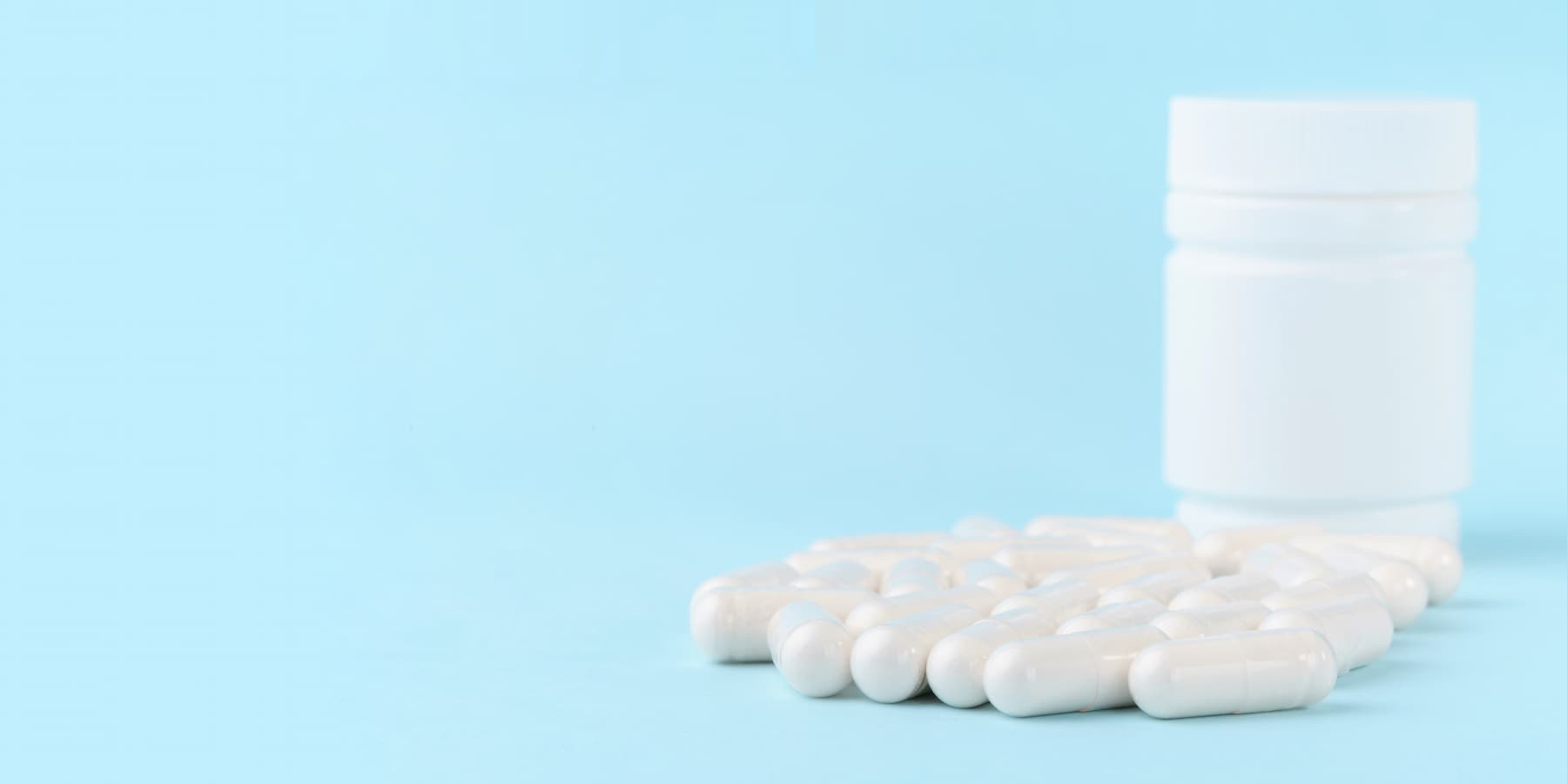
Chondroitin helps the joints and other elements of the body.
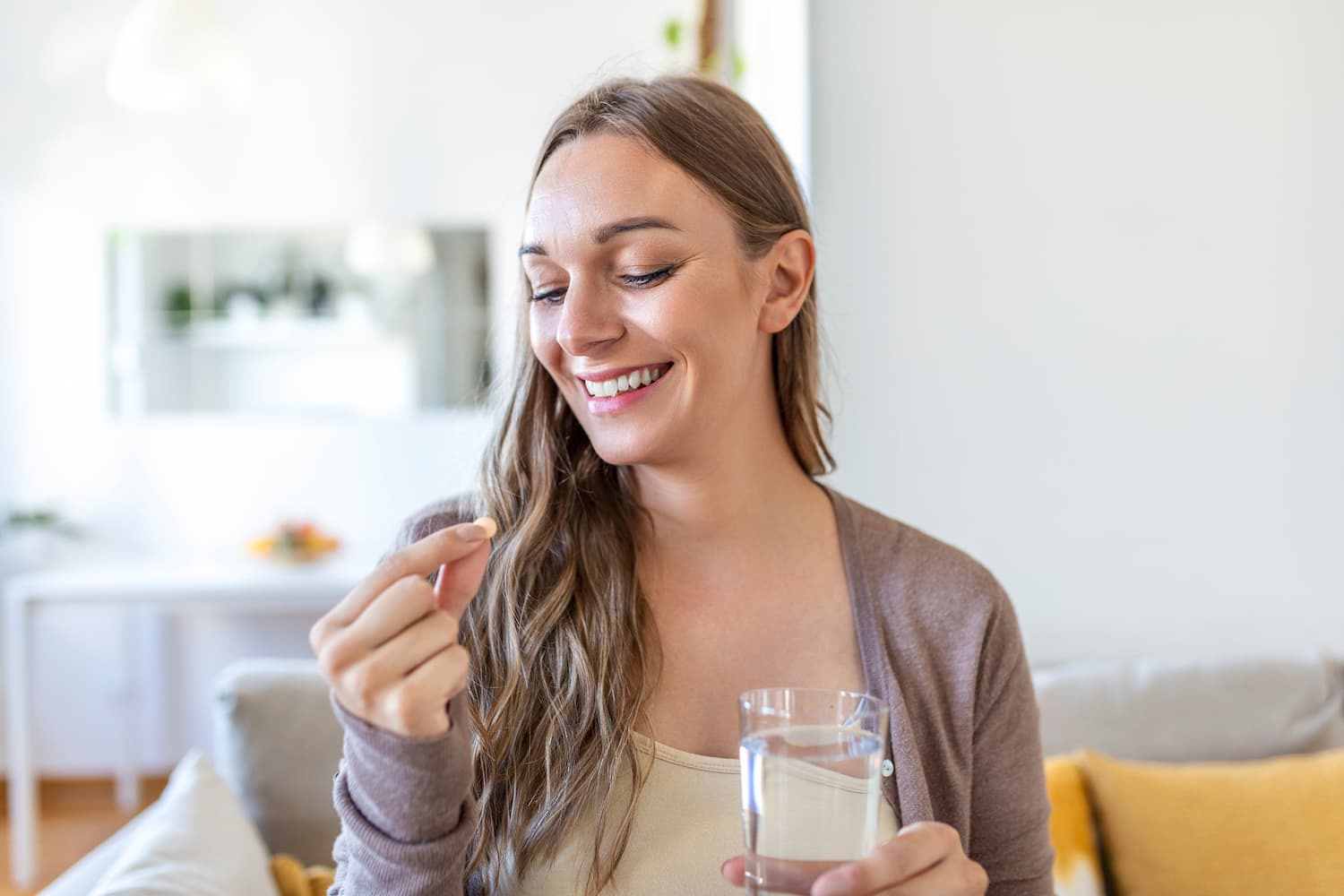
Glutathione is one of the most potent antioxidants for supporting the body's health. Find out how it works and where to get it from.
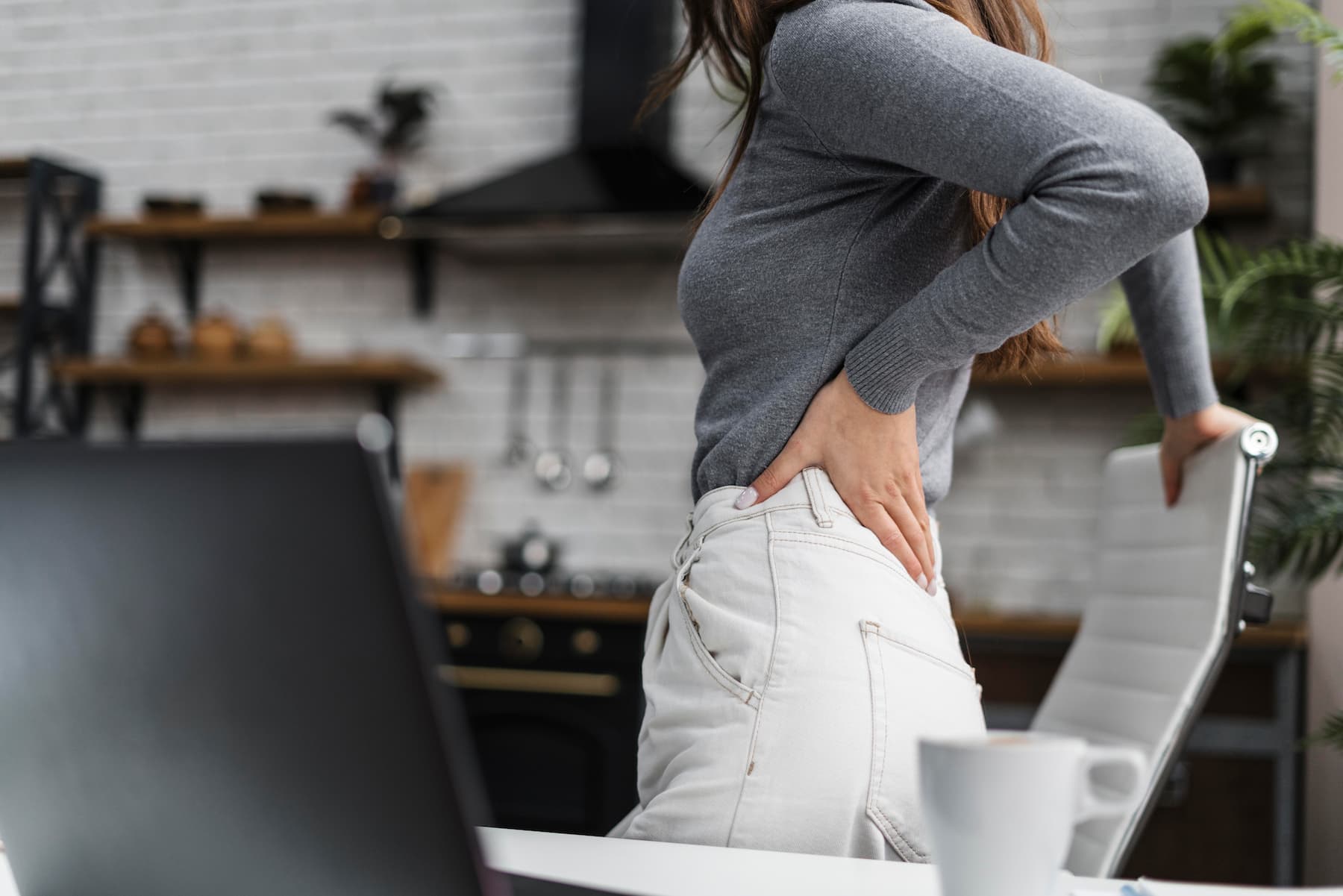
See why hip joints hurt and how to treat their ailments.
